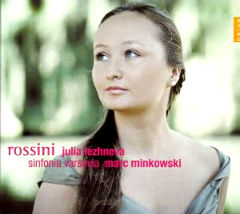While major stars like René Pape and Piotr Beczala had to wait until they were over 40 to record a solo aria CD, Julia Lezhneva has just done her first—and she’s only twenty-one! After a drought, CD companies are issuing a surprising number of debut recitals; Nino Machaidze, Olga Peretyatko, Mojca Erdmann, and Aleksandra Kurzak (only females need apply?) have discs just out or due soon.
Such calling-card programs may herald a brilliant star, or sometimes just a flash in the pan (think, say, Susan Dunn or Sylvia Sass). Released on Naïve (the label name a little too ironic in this case), Lezhneva’s disc is a disturbing case.
Heavily promoted for her precocity, the Russian singer tackles a challenging Rossini program of six iconic arias from Semiramide, La Donna del Lago, L’Assedio di Corinto, Otello, Guillaume Tell and La Cenerentola. Featuring the Sinfonia Varsovia and chorus conducted by her principal enabler Marc Minkowski, this CD probably wasn’t such a great idea.
The inexperienced Lezhneva just isn’t very satisfying, particularly when her recorded competition (just in the LP/CD era alone) includes Maria Callas, Montserrat Caball?, Marilyn Horne, Teresa Berganza, Joyce DiDonato, etc. One discovers a small, pretty voice of no great individuality or dramatic insight—performances you’d be happy to hear from “the girl most likely to succeed” at the local conservatory. I was flabbergasted to see that “Gramophone” had dubbed it one of its top CDs for July—until I spied a half-page ad for it in the magazine.
Some of the PR spin surrounds the question of whether Lezhneva is a soprano, mezzo or even a contralto. The color of the voice suggests it’s more of a soprano, yet all the high notes turn white and glassy with no punch or pizzazz. She sounds most comfortable in the middle of her voice, suggesting she’s another “lazy soprano”– someone like Frederica von Stade or Magdalena Kozena—able to sing soprano or mezzo roles as long as they don’t rise too high or dip too low.
httpv://www.youtube.com/watch?v=gBNIuhiyIdc
While Lezhneva does display impressive agility, her trills are no great shakes (or, rather, that’s just what they are). Her French and Italian are adequate, but there’s no real connection to the text or the dramatic situation—Mathilde sounds much like Desdemona or Pamira. And instead of the great Queen of Babylon, we get something that instead sounds like her wanly winsome lady-in-waiting.
As my mind sometimes wandered listening to the CD, I couldn’t help recalling another prodigy: back in 1988 (has it really been that long ago?) Cecilia Bartoli recorded her all-Rossini debut recital. That disc illustrates all too clearly what’s wrong with Lezhneva’s—even at twenty-two, Bartoli was already a mature artist—that tangy timbre and individual technique (yes, that aspirated coloratura creeps out already) projected with infectious flair. Bartoli’s exciting Cenerentola rondo—soon to become her trademark –vividly conveys Angelina’s happy triumph, whereas Lezhneva’s seems little more than a sedate vocalise.
Disappointed by the Rossini, I wondered how Lezhneva might fare in other music. Since she starred as the page Urbain in the revival of Les Huguenots which received enormous attention recently in Brussels, I listened to a recording of the Meyerbeer broadcast, also conducted by Minkowski. Amidst the cast’s generally lousy singing, her portrayal only confirmed the general impression of the CD: the voice tiny, charmless and pinched on top.
Just as I was ready to just write off Lezhneva as some sort of bewildering stunt perpetrated by Minkowski and her CD label, I recalled that she was also featured on the third (and best) complete recording of Vivaldi’s first opera Ottone in Villa, latest in Naïve’s revelatory series
. This is quite another story altogether: she’s superb!
The more “instrumental” nature of the vocal writing suits her (along with no need for high notes) and, guided by Giovanni Antonini, one of world’s best Vivaldi conductors leading his top-notch Il Giardino Armonico and surrounded by seasoned Vivaldi specialists Roberta Invernizzi, Sonia Prina and Veronica Cangemi, she’s transformed.
Despite the opera’s title, Lezhneva’s Caio Silio is the dominant role, containing an astonishing eight arias. The fiery florid singing here is much more impressive and connected to the dramatic moment, while the slower arias are especially magical, including “L’ombre, l’aure” with its bewitching echo, and the extraordinary “Leggi almeno, tiranno infedele,” her hushed singing of which was particularly singled out by New Yorker music critic Alex Ross on his blog. That aria’s beautifully spun lines demonstrate that Lezhneva can indeed summon up an intensity to grab and hold the listener’s attention.
Ironically, as Bartoli did in 1990, Lezhneva will make her US debut at Lincoln Center’s Mostly Mozart Festival. I attended Bartoli’s concert that July (where she was second-billed to Jean-Pierre Rampal), and I suspect that few in the audience that night had any idea who she was. Yet after she tossed off “Tanti affetti” and “Parto, parto,” the usually sedate summer audience was stomping and yelling its approval.
On the other hand, at last moderation will prevail for Lezhneva—her debut appearance next month in New York will be as the soprano soloist in the Mozart “Requiem.” This weekend, however, Minkowski will conduct her as Fiordiligi in a concert version of Mozart’s Cosi fan tutte at the Beaune Festival—surely a wrong-headed bit of miscasting.
How Lezhneva’s career will play out is difficult to predict—Bartoli’s 1988 recording suggested that in twenty years she’d probably be singing those “General Horne” Rossini roles like Arsace and Tancredi, but history hasn’t worked out that way at all. Wisely, Lezhneva steers clear of 19th century bel canto next season: tackling instead Sesto in Handel’s Giulio Cesare and Trasimede in Vivaldi’s L’Oracolo in Messenia both in concert and on recordings. Let’s hope she can put this rather unfortunate debut CD behind her and not crash and burn like some others thrust into the spotlight before they were ready.




